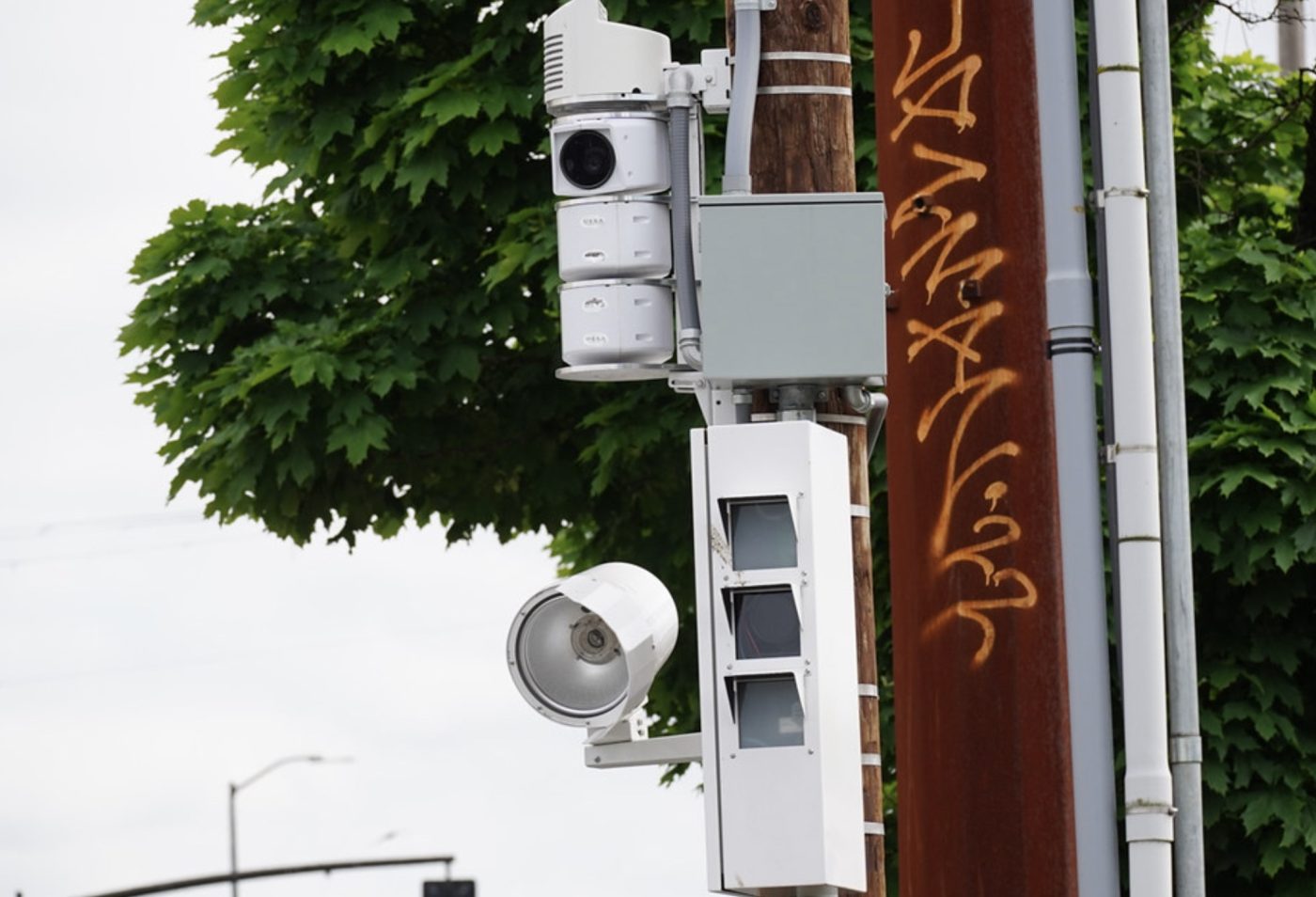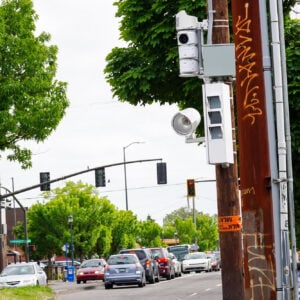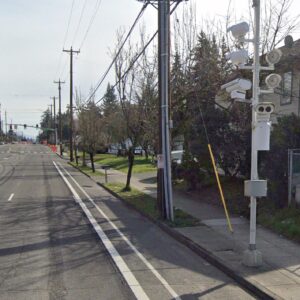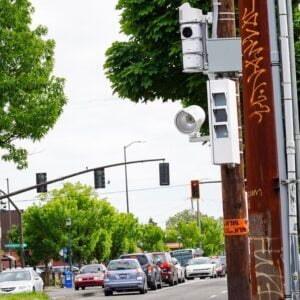
Over the past week or so, several people contacted BikePortland with reports that automated speed enforcement cameras in their neighborhood had either fallen into disrepair and/or had been removed. In digging around about what might be behind this, I learned some pretty big news: the City of Portland has finally inked a contract with a new company to supply and operate the transportation bureau’s speed and intersection safety enforcement camera program.
I say “finally,” because problems with the original vendor have come up several times since at least 2021. Back then, a former Portland Bureau of Transportation Commissioner told BikePortland during an interview that the relationship was so bad that the city had considered firing the company. PBOT has never publicly acknowledged a major issue with its previous vendor, but has referred to “supply chain delays” as one of the reasons its camera enforcement program has not grown as expected.
Today PBOT says they and their partners at the Portland Police Bureau will work with NovoaGlobal to supply and operate their program with, “the most advanced automated technology available.” “NovoaGlobal will be the City of Portland’s sole supplier and operator for the Speed and Intersection Safety Camera program, as well as PPB Traffic Division’s two mobile speed enforcement vans,” reads a statement from PBOT today.
NovoaGlobal is based in Orlando, Florida. The company’s website features automated enforcement tolls for crosswalks, school speed zones, oversized vehicle identification, and more. They’ve been hired to supply and operate to cameras all over the U.S. including Washington D.C., Tacoma, and Beaverton.
PBOT crews are currently at work replacing all 32 existing camera locations and retrofitting the PPB’s two mobile vans. The new camera installation work is projected to be complete by November 1st. While the work is being done, PBOT announced today they will add three more camera locations:
- SE Powell Boulevard at 34th Avenue (westbound)
- NE 82nd Avenue at Fremont Street (southbound)
- NE 82nd Avenue at Klickitat Street (northbound)
PBOT also says that by January of 2026, they’ll install two speed safety cameras on SE Powell Boulevard at or near 60th Avenue. After that, the next two locations will be on SW Barbur Boulevard at the 5900 to 6100 blocks.
This doubling down on camera enforcement shows how confident PBOT is in the technology. PBOT claims that speeding at all locations has dropped by 59% at all camera location since the first ones were installed in 2016. And for an agency often embattled with criticisms, enforcement cameras are actually popular. In a November 2024 survey commissioned by the City of Portland between 72% and 82% of respondents said they support the cameras.
These cameras are pillars of PBOT’s Vision Zero program and will likely be a point of discussion at the new Vision Zero Task Force being assembled as part of a renewed effort to save lives spearheaded by City Councilor Tiffany Koyama Lane. With renewed political support, a new supplier and operator lined up, and a more streamlined method to review camera citations, this technology is finally poised to reach its potential.







Thanks for reading.
BikePortland has served this community with independent community journalism since 2005. We rely on subscriptions from readers like you to survive. Your financial support is vital in keeping this valuable resource alive and well.
Please subscribe today to strengthen and expand our work.
This is fantastic news. PBOT could balance it’s budget with enough of these.
Now if we could actually get enforcement at the posted speed limit, instead of whatever 11 MPH over baloney they’re doing currently
Gotta get the legislature to change that. The statute only allows it for 11+ over.
I think there is reluctance from law enforcement and the courts to drop the 11 MPH over threshold for fixed photo radar because it’s in the statute for photo red light cameras that are also allowed to be used for speed enforcement. They don’t want inconsistent application to speed enforcement depending on if it’s at red light cameras versus fixed photo radar. The Oregon Legislature could fix things if they amended the statutes to be consistent.
Was this statute’s purpose to focus more on dangerous speeding or does this have something to do with odometers and traffic camera calibration or something else?
That’s a good question and I think it’s a couple of things:
1. When photo radar was first authorized in Oregon by the Legislature years ago it was as a pilot project in select cities with strict requirements in statute and a sunset date. Those requirements included a minimum threshold over the posted speed for issuing citations to help with public acceptance. The Legislature didn’t want automated speed enforcement to be perceived as simply a revenue generator for government.
2. By keeping some reasonable threshold above posted speed for automated enforcement it reduces the likelihood of successful challenges in court by those issued citations who want to have it thrown out by a judge based on improperly calibrated equipment. Law enforcement is often required to provide their calibration records for radar equipment to the courts when citations are challenged.
Really helpful, thanks. I know some cities like NYC are starting to use LIDAR, which tends to be more accurate than radar. Not sure if the new vendor for PBOT is changing the tech. Maybe the perception in the courts will change accordingly as better tech gets adopted?
0-10 is a D violation, 11-20 is a C violation. Nobody gets pulled over for a D violation unless police really, really wanted to talk to you for other reasons. Fines haven’t changed in a while, so it isn’t worth anyone’s time for a D. I’m all for a change by the legislature: they should pull photo tickets out of the traffic code and give them their own category akin to a parking ticket with higher fines: it doesn’t go on your driving record, but you pay for that benefit and they don’t have to rebuttable presumption of the driver any longer so far fewer challenges.
I recently received a ticket from an automated speed camera in Portland, at SE 99th & Stark, for going 36 mph in a 30 zone. Yes, I should not have been driving over the speed limit. I regularly read that people say they don’t give tix for less than 11mph over, but that is not my experience.
Interesting. Seems contrary to what others are saying. Anybody care to clarify what’s up with this?
Amen! And here’s hoping the city has a good handle on privacy and data retention for what cameras capture. That is my only reservation about these cams.
I hear this response a lot. The reality that these cameras actually save lives should outweigh concerns with privacy – especially given that there are cameras *everywhere* already anyway.
Not just cameras everywhere but pretty much every new car collects mountains of data on their drivers’ location and driving habits.
I don’t think simply dismissing privacy concerns is fair here, especially given the very real threat of how a surveillance cam network could be weaponized by the current federal admin.
I’m supportive of speed cameras, but there are some very simple measures we could take to ensure they’re not used in awful ways while still providing 100% of their benefits.
Some examples:
There is zero conflict been enforcing the law and respecting privacy.
If someone is not speeding, don’t take a picture or record any days about their vehicle. It’s that simple. And maybe that’s how it already works, but a couple of lines in state law making retaining data not needed for enforcement purposes illegal would set people’s minds at ease.
In an era where ICE is snatching people off the street, I’m not sure it’s that cut and dry.
What privacy expectations are there on a public road?
I didn’t expect my movements to be tracked and recorded by a government body. That’s one reasonable privacy expectation.
Spoiler alert: the NSA is already doing this.
“the NSA is already doing this”
I highly doubt they are. But I am also quite aware of other efforts to build a large scale database of vehicle locations.
None of that means the state shouldn’t render a common complaint about speed cameras moot in order to make it politically easier to set up more of them.
If these make money, other than supply issues, what’s the reason to not have them on every block on every arterial. I wait 30 to 90 seconds to cross 82nd each afternoon and almost every day a driver runs a very red light while the speed sign down the block registers their speed as SLOW DOWN because they’re going 10+ over the limit.
The red light running is out of control. It’s a huge hazard. It only creates more delay when every sane driver is trained to wait for all the red-light running cross traffic when their light turns green.
Totally agree. I live near the Dekum/MLK intersection and will wait 5 seconds after the light turns green to cross it. 4/5 someone runs that red light and I’m surprised there have not yet been any collisions.
I am certain the same scenario plays out 100’s of times elsewhere in the city.
We could do with a helluva lot more cameras … and until that time, what about changing the frequency of lights turning red? Although many motorists run red lights, most don’t. Which means if the lights turned red more frequently, we’d be slowing traffic overall. I know, it would INCONVENIENCE motorists to have to wait at more red lights. And as we have learned time and again, inconveniencing motorists should not happen, even if the alternative is the safety and health of humans, and other beings living in our city. Sigh.
The number of tickets issued is constrained by the capacity of the court system to review them. ‘Decoy’ cameras at multiple locations that can be turned on and off randomly would probably help.
You consistently have the most outlandish takes. On a lot of streets, that would slow down busses more than anything. Don’t punish transit riders for a few drivers who don’t have the emotional regulation to go the speed limit.
This is a moderate position for her. She usually just advocates we simply close roads except for ones she rides her e-bike on.
Disabled, low income, any working people can just pound sand unless they too have a nice job at OHSU.
Not all disabled, low income and working people can drive. Do you only care about the drivers in those groups because it’s convenient to use them as an excuse to keep the status quo?
I think most disabled and low income people use transit which uses roads that she and you apparently think we should shut down in some crazy rant.
I was not referring to car drivers.
Who mentioned or is defending the status quo?
WTF are you even talking about?
Thanks for letting her know what she advocates. Poor thing, until now she thought she had a mind of her own! And that what she advocates for is thriving communities in which people are safe.
There are plenty of cities around the world that prioritize public transit over private motor vehicles, and I’d love Portland to emulate them. But the idea that slowing all motor vehicle traffic is bad because buses would be slowed — seriously, does anyone who does have a mind of their own fall for that kind of faulty logic?
Many jurisdictions time the signals to match the posted speed limit, to reward drivers for obeying the law. Some communities experiment by setting the signals to lower than the posted speed limit, particularly on high-crash corridors, but don’t tell the city electeds who keep resisting lowering the posted speed limits. In most cities, elected city councilors are the biggest activists towards increasing speed limits – reflecting the views of the people who actually voted for them or gave them money – and the most opposed to traffic calming on major stroads (but not on the neighborhood streets of where they live…)
So awesome . . .
Instead of using PBOT resources (employees) to install, manage, and maintain cameras for the public good, we have to outsource to some private company who’s in it to make profit. Yeah that always works well.
Portland has a bad reputation for outsourcing what should be done by public employees. Looks like this is no exception.
Generally, your worries might be warranted in a few cases elsewhere. Oregon state law prohibits the use of funds from speed cameras for use in anything other than funding programs directly associated with the high crash network. AFAIK contractors do not receive any part of violation payments. They just provide the tech support.
From the PBoT site:
I think OP was referring to PBOT outsourcing the
installation andoperation of these cameras to for-profit companies, which is what the article says (“supplier and operator”). I’m sure the statute you refer to governs the use of funds that governments receive from speed cameras – AKA, after any middle man takes their cut (or they could just be paid separately through PBOT’s budget).In any case I agree with the OP that these things should be operated in-house by PBOT, and we shouldn’t be giving away public funds as private profit. In fact I kinda wonder if that’s just poorly worded – seems crazy that PBOT wouldn’t be the ones operating these cameras.
No wonder PBOT is paying a company exorbitant money to manage existing cameras instead of doing so in house (where it might increase revenue). The car-brained legislature essentially sabotaged camera-based enforcement.
From the article “ PBOT crews are currently at work replacing all 32 existing camera locations”
Do you expect PBOT to design and build their own cameras in house?
No… But the article says the vendor will operate the cameras, not just supply the hardware.
“Instead of using PBOT resources (employees) to install, manage, and maintain cameras for the public good, we have to outsource to some private company who’s in it to make profit. Yeah that always works well.”
It’s no different than outsourcing the operation of prisons. And there’s no problems with that, right?
I hope PBoT (and other local jurisdictions) have learned from other places experience and have performance guarantees per contractor camera calibration meeting guidelines. And as for the “11 MPH” threshold for ticketing…I would add a recommendation that PBoT and other jurisdictions send educational warnings to drivers / vehicle owners with vehicles recorded in the 2 to 10 mph (or similar) spread below a full ticket.
I’d argue 5 over (instead of 2) would be more reasonable and cost effective. People just kinda add 5 to all speed limits, that’s such a big cultural thing across the country. There is a political cost to being seen as annoying and overly punitive
This is a really good idea nubaloo. As Fuzzyblueline said above, it’s likely both the perception of abuse of the system (rather than actual abuse), as well as limiting frivolous challenges in court, that seems to have artificially set the limit at 11 over. My guess is the camera calibration (more frequent for radar vs LIDAR) is more a rubber stamp for legal purposes rather than an actual tech issue. There’s proly some statistician out there that can point to an exact number better than us, but 5 over seems reasonable, particularly in the 15-30mph limit areas.
Is PBOT doing anything to try and combat the scourge of unlicensed vehicles? So often when I see particularly egregious driver behavior the vehicle has no plates. I’d like to see them really start to use parking enforcement officers to immediately tow any vehicle spotted with plates that are missing or expired by more than 1 month.
Stop allowing people to drive around with no license plates.
Oh hold on now…that’s not equitable.
See this contract example from the City of Everett about how such a program might work, including the privacy issues raised here.
https://www.everettwa.gov/AgendaCenter/ViewFile/Item/14851?fileID=84625
In 2022, this was the cost structure: MONTHLY FEE Pricing for Systems relating to fixed red light photo enforcement shall be as follows: • $3,999.00 per System per month. Pricing for Systems relating to fixed school zone speed photo enforcement shall be as follows: • $2,999.00 per school zone enforcement System per month, 12 months a year.
We will never have adequate enforcement by patrol vehicles. If Portland is to ever come close to achieving Vision Zero, we will need automated enforcement at scale. Given the billions ODOT is determined to extract and spend on the wasteful Rose Quarter Project, this would be a drop in the proverbial bucket.
Am I living in the Twilight Zone or weren’t all these cameras shot out by some ex army guy with a handgun?